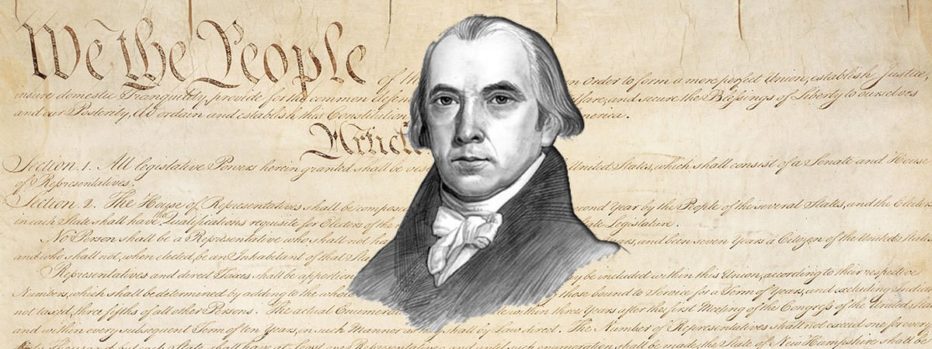Party Trumps Institutional Separation
Don't expect the Congress (i.e., the Senate) to pull us out of this shutdown mess.
 It is rightly pointed out that the legislative branch is constitutionally separate from the executive and therefore the Congress could pass a spending measure that would open the government without Trump’s acquiescence, and further, it is wholly possible that there are enough votes to override a veto (if said vote could be held in secret).
It is rightly pointed out that the legislative branch is constitutionally separate from the executive and therefore the Congress could pass a spending measure that would open the government without Trump’s acquiescence, and further, it is wholly possible that there are enough votes to override a veto (if said vote could be held in secret).
Don’t expect such an outcome.
Let’s consider the basic American civics lesson that leads to the initial assertion (the legislature can act without the executive) and the political science which then tells us why that won’t happen.
We are taught, correctly, that the US Constitution establishes a system of separated powers with three branches of government: the legislative, the executive, and the judicial. The first makes the laws, the second puts them into practice, and the third interprets their application. We are often told that these branches are “co-equal” which is true in an abstract sense, but in terms of actual power that is not the case. Indeed, at least on paper, the legislature is the most powerful and the courts the weakest.* Separation of powers flows from the theories of Montesquieu (among others) as applied by the Framers of the US Constitution and was truly made manifest when the Philadelphia conventioneers decided to eschew the idea that the legislature would select the executive.** In addition to this, we have a systems of checks and balances wherein each branch has some ability to encroach on the powers of the others. For this conversation the veto and the veto override are the most salient examples. For those interested, Federalist 51 gives one of the best theoretical accounts of how this was supposed to work, and why it was implemented.***
As I have noted before, and no doubt will continue noting, the Framers of the US Constitution did not understand, nor anticipate, political parties as a central actor in representative democracy. Parties ended up affecting legislative behavior in ways not fully understood when the system was designed (and are a major reason why the Electoral College never worked the way they thought it would).
Parties are central to understanding why it is highly unlikely that the Senate will help to open the government unless Trump is on board in some fashion.
The existence of parties changes the basic logic of separation of powers in ways that are not usually taught in basic civics/American government courses. We get told a tale of separated powers with institutional prerogatives but ignore the fact that parties are also institutions which can bridge the separations between executive and legislative.
So yes the legislature is a separate power from the executive but the Republican Party is an also an institution, and it connects the Senate and the President currently (and separates the House from the Senate within what is technically one branch).
So, while McConnell might be rightly seen as the keeper of one institution, the Senate, which is separated from another institution, the presidency, he is also the leader of the Republican Party and so is the President. As a result, and especially since the House is controlled by the Democrats, McConnell’s allegiance is more to party than to institution. We all understand this to be true, but we often do not see how this dynamic affects the separation of powers story that we are taught from our youth.
All of this is reinforced by electoral incentives–the Republicans in the Senate know that their votes support the head of the party, i.e., Trump, and to go against Trump is to risk losing reelection. Again, these factors are far more important than protecting the institutional powers of the Senate/Congress.
So, when McConnell is criticized for putting party first, the answer is: yes, he is (and the incentives of the system that have evolved to dictate this behavior). I am not, by the way, addressing here any normative judgement, but rather just stating empirical facts.
Put another way: the only time textbook type separation of powers behavior takes place (where the ambition of the Congress truly buts heads with the ambition of the presidency) in when we have fully divided government. But note that the separation there is really about party, not institutional roles.
For a much deeper discussion of this, I would again recommend Presidents, Parties, and Prime Ministers: How the Separation of Powers Affects Party Organization and Behavior by David J. Samuels and Matthew S. Shugart. In that book the authors note that in separation of powers systems, parties tend to be “presidentialized.” This means “parties delegate considerable discretion to their leader-as-executives to shape their electoral and governing strategies, and that parties lose their ability to hold their agents to accounts” (37).
Sounds familiar, yes?
The Republican Party is headed by Trump. Congressional Republicans still believe (correctly, I think) that their electoral health is dependent on Trump, ergo they will stick with Trump. Further, they have no mechanism to get rid of him as party leader (that are plausible) until 2020.
And so I do not expect McConnell to go against the leader of his party, even though McConnell very likely could end the shutdown. Whatever comes will require some kind of agreement with Trump.
*But that is another conversation entirely.
**Most of the various debated plans had the legislature picking the president. One the president was no longer dependent on the legislature, we created presidentialism. It is worth noting, however, that the Electoral College was designed in a way that assumed the House would frequently choose the president. This ended up not being the case.
***Written by a guy, Madison, who originally designed a system (the Virginia Plan) that would have had the president selected by Congress.





@Teve: I think what they have on Graham is re-election.
Isn’t this to some extent a modern version of something we’ve seen since the beginning of the Republic?
To pick just one example, in the 1790s the Senate was controlled by Federalists while the House was controlled by what would become Jefferson’s Democratic-Republicans and they were at each other’s throats for much of the decade. Indeed, one can point to multiple periods during the past when this was the case.
@Steven L. Taylor:
Indeed, Graham is doing what he always does in the years prior to an election, moving in a direction primarily designed to hold off a strong primary challenge.
@StevenTaylor I agree with all of this.
I’m only passingly familiar with our early legislative history. There was a longish period before roughly 1992, though, in which institutional prerogatives seemed to matter more than they do now. There were (primarily) Southern Democrats usually willing to vote with Republican presidents and (primarily) Northeastern Republicans often willing to vote with Democratic presidents to the extent it accorded with the mores and interests of their constituencies. That has largely ended. We essentially have parliamentary-style lockstep voting now.
Additionally, it seemed that even more recently than the emergence of ideologically-consistent vice catch-all parties here, there was more of bipartisanship, in the sense that popular programs advanced by a president would achieve significant support from the opposite party. Now, the parties (and, especially the Republican Party) seem to vote purely on a party-line basis. If Obama advanced a program that several Republicans voted for under GW Bush, they would now reflexively oppose it. While not *as* true for Dems, I think almost all would reflexively vote against even a good program advanced by Trump.
@Doug Mataconis: I am not suggesting it is new (quite the contrary, really). It is just that it runs counter to the normal narrative.
@James Joyner:
Except without the mechanisms in a parliamentary system to deal with impasse. This is actually and important part of the broader analysis.
If we didn’t have separation of powers we couldn’t have this kind of shutdown, for example.
@James Joyner:
I don’t think it is ideology, per se, as I don’t think that a lot of what the GOP is doing is about firm ideology, but is rather about electoral fortunes.
The shift was, as you note, the disintegration of the “Southern Democrat” which created a very different dynamic. This was a legacy of the Civil War and Reconstruction more than ideology (and certainly not because of institutional design). I think this is one of several underappreciated elements of our political evolution.
Had we not had the Civil War, the parties would have behaved more like they are behaving now many decades ago.
@James Joyner:
Couple quick thoughts — given that polls suggest the Democratic base tends to be more supportive of bipartisanship than the Republican base, Democrats definitely have a bit more (theoretical) flexibility.
The First Step Act is a good example of a bill that started developing under Obama and was, at the time, blocked by Republicans. Trump’s openness (and in particular Kusher’s interest) in Federal Criminal Justice reform gave it renewed life.
And it passed with a solid amount of Democratic support in both Houses.
There were definitely some Democrats who were against it because they didn’t want Trump to get a win. But far more (based on polls I saw on the issue) were against it on policy grounds. Further, the reality was that the far more critical resistance (which came close to scuttling the bill) was due to Republican attacks on it. Without the support of Democrats, it wouldn’t have passed.
All that said, Criminal Justice reform is a magic space where there is a lot of agreement between members of both parties. It’s hard to think of another issue (off the top of my head) with the same appeal and alignment.
@James Joyner:
BTW, this would make for an interesting research project along with focus on the behavior of Southern Dems.
I would hypothesize that the Congress probably acted more in line with the presidentialized model than you might think, because the story we are all told (in HS, in college) is the separation of powers tale.
In other words, I would suspect that congressional majorities behaved in a way commensurate more with party leadership than with protection of institutional prerogatives.
As Doug alludes above, it goes back to the beginning.
So Graham says, regarding Trump declaring a national emergency
“Before he pulls the plug on the legislative option…”
I was taken aback – when did the legislative process become just an ‘option’?
Am I reading too much into this, or is this another step in the delegitimization of Congress vs the Presidency? The fact that the first hits on the phrase showed up on conservative leaning media didn’t help my mood.
link
@Steven L. Taylor:
I guess the question then becomes what’s normal, what we want to think about how the system works or how it has actually worked for more than 220 years?
@Doug Mataconis: I think that we (Americans, writ large) talk about our system in a way that is far more informed by a mythology of intent and design than it is about the reality of how the system actually functions.
@restless: It could be a delegitimzation of Congress, but it may simply be a shorthand way of saying that since there is no longer party unity (for all THAT was worth over the past two years), there is no solution to the shutdown likely to come from Congress unless/until Trump will permit one barring capitulation by Democrats in the House.
If it happens that Republicans in Congress feel permission from their constituencies, (i.e. Trumpies or Oligarchs [who I would hold have “no dog in this fight”–so far]) to break ranks with Trump and override a veto, we could have a new game. With 68% of Republicans supporting both the wall and Trump, I don’t see such permission coming. Time will tell.
@Steven L. Taylor:
Since I’m someone who brought up intent in the comment thread under the “Trump’s the Biggest Obstacle” post, I’d like the challenge the idea that considering intent is somehow “mythological.” I am not a political or historical scholar, so I will humbly concede all you are stating in this post. But, I do work in problem solving and the core methodology there is to consider the expected or desired outcome (intent) in comparison to the current condition or result (“how the current system functions”), then to analyze why there is a gap and what measures should be taken to remediate that gap.
So, granted the Framers didn’t consider Parties in their model of government, the intent is clear (having read Federalist 51, thank you for sharing) that it is necesary for the preservation of liberty to partition power between the branches and maximize to the greatest extent possible their independency. Therefore thinking as a problem solver, I see the party loyalty over institutional norms (in their recent behavior, though not always so) as a cause for the current state of our politics (800,000 federal employees unpaid against the polled preferences of the majority for the sake of a wall that is the same) rather that a set condition that has to be accepted. The political incentives you bring in are also causes needing countermeasures.
To me, that means go hard at the movable members of the GOP Senate who face election in 2020 or 2022, which include McConnell. Change their incentives by infuriating their constituents (though likely not their tribal supporters) about their callousness regarding the shutdown and their cowardice in acquiescing to Trump. Senators run at the state level, so none of them are as safe as a Representative in a gerrymandered district.
Trump is immovable and far removed from the public’s ire. Cut him out of the equation!
@Steven L. Taylor:
True, but there are several Federalist Presidential systems in the world and only one of them face regular government shutdowns. I don’t remember any government shutdown in Brazil. It might have cops striking or drug gangs paralyzing states, but not a federal govern shutdown.
I wonder how much the underlying structures of the Roman Republic influenced the framers of the Constitution.
There are similarities, like both were dominated by landed aristocracy, but also depended on a large population of yeoman farmers. And Rome lacked political parties, or even factions, for a long time.
Rome had checks and balances, mostly in the for of term limits and a large Senate made up of the upper classes. It also had separation of powers, as in that the various magistracies had defined, though sometimes overlapping, areas of operation. A Tribune, for example, could not engage in foreign policy. Also most magistracies allowed for two or more magistrates in office at a time, and each could veto the other (and there was no override).
In Rome the various magistrates and the Senators were jealous guardians of their power and prerogatives, as they owed allegiance to no one but their family and patrons (if any). Without institutionalized political parties, the same might have happened in the US, or for that matter int he federalized republics that followed the American example.
At this point, everyone is waiting for Mueller’s report and/or civil unrest in DC. This stalemate will not break otherwise.
There is a federal law being discussed that would make lynching people based on hatred a federal crime. The big group opposing that law is a group of Conservative Christians. But they’re not opposing the law, they’re opposing including gay people on the law. if conservative Christians wonder why people are leaving that religious and political belief in droves, they’re more clueless than I think they are. And despite the fact that I’m 42, and easily halfway towards my death, I’m happy that in my lifetime I will see them lose and lose hard.
@Scott F.:
Sure, but my point is that if that was was happening, the Senate would be compelled to work with the House so as to be independent from the president. Instead, because of party, the Senate leadership is working with the president.
Yes, to a point. The problem is, with some exceptions (e.g., Collins), there aren’t all that many who are persuadable, because they fear their voters, who are pro-Trump (as leader of the party). Worse, they fear primary voters more than they fear general elections voters and the primary voters are likely to be especially pro-Trump.
@Andre Kenji de Sousa:
True-I did not mean to imply otherwise. The US is an outlier in this kind of outcome. I was simply noting, in context of James’ comment, that if we had a parliamentary system we would not have a shutdown because you can’t have this kind of impasse in a fusion of powers system.
@Kathy: Indeed–the basic concept of a Senate comes from the Romans.
@Steven L. Taylor:
I acknowledge all the very real politics in play.
I guess my point is even the much less persuadable GOP Senators are more persuadable than Trump will ever be as far as the Wall goes. Convince enough Senators that they have as much to fear from the general electorate for their statewide office as they have from potential primary opponents and there’s some chance of breaking the impasse. There is no similar leverage against Trump.
The most reasonable course of action is to apply maximum pressure on the weaker part of the fortifications.
@Resistance Ron: “I’m not sure the 17th Amendment has worked out as intended.”
Oooh, Baby Jenos is now a scholar of history. Nice that he took time out from his busy scheduling of begging for sympathy by pretending to be dying to get that doctorate.
Now maybe he can piss off again.
@Kathy: “There are similarities, like both were dominated by landed aristocracy, but also depended on a large population of yeoman farmers. And Rome lacked political parties, or even factions, for a long time.”
I think that the Gracci brothers migh disagree 🙂
Perhaps in Rome the ‘parties’ were the classes and the clans within the upper classes.
@Barry:
While I sympathize with the goals of the elder Gracchus, in the end the means he chose were as wrong as the goals of his opponents.
I need to get a good book on Roman politics. Histories give it mention, and some explanation, but leave much out. The Optimates vs Populares is depicted as a fight between political parties, but I don’t think the Romans had a conception of parties any more than they did about Quantum Mechanics.
For that matter, I wonder what conception the American Revolutionaries had about political parties. Certainly not the same we have today.
@Kathy:
I don’t think they foresaw people cutting their own throats just to spite others.
Anyone who expects Congress to “pull us out of this shutdown mess”, or any mess for that matter, probably also laid some money down on the Dallas Cowboys last week.